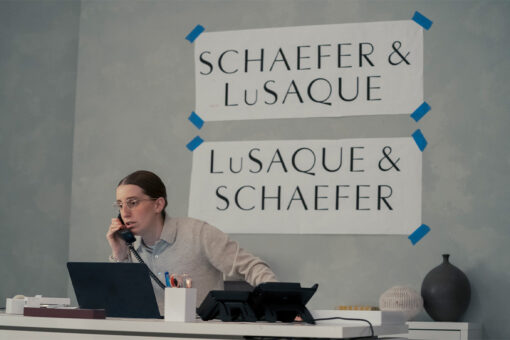What do you get when you cross a hipster, a Hasidic Jew and some music? Listen to Zusha and you’ll find out.
Let’s go back in time for a moment. The year is 1800, and Reb Zusha of Hanipol is crying on his deathbed. He is surrounded by his students who attempt to console him: “You are almost as wise as Moses and as kind as Abraham,’ they say, “you have nothing to fear when you pass from this world.” Reb Zusha replies, “When I pass from this world and appear before the Heavenly Tribunal, they won’t ask ‘Zusha, why weren’t you as wise as Moses or as kind as Abraham?’ Rather, they will ask, ‘Zusha, why weren’t you Zusha?’ Why didn’t I fulfill my potential, why didn’t I follow the path that could have been mine?”
Fast-forward 200 years and a neo-Hasidic funk-soul band bearing Zusha’s name is making waves in the Jewish music scene. Led by singer Shlomo Gaisin and guitarist Zachariah Goldschmiedt (who sings as well), they’ve released three full length albums, two EP’s and twelve singles. Their lyrics are almost entirely in Hebrew, drawing on traditional prayer, mystical texts and niggunim. Their most streamed song on Spotify is “Baruch Hashem” with Matt Dubb, but I would urge any listener to look beyond this in favour of their more intimate and soulful music. The pair, alongside ex-band member Elisha Mlotek, met at a Chabad house in Manhattan and began making music together straightaway. Their first release, an eponymous EP titled “Zusha,” came out in 2014, followed by a debut full-length album, “Kavana,” just two years later.
“Kavana” was my first discovery of Zusha, and is a personal favorite for its laid-back and intimate feel. The album art by Annita Soble is modern-day Chagall meets graphic design, portraying a colorless Rebbe surrounded by followers at a farbrengen or tisch (a Hasidic gathering, usually with a meal, where people share ideas and inspire each other, usually with some kind of singing). The song “Pashut,” which means “simple” in Hebrew, is a wordless niggun with pared-down guitar, a relaxed groove in the drums and some subtle strings in the background that thicken the texture when the vocal line becomes more energetic. To me, this song is a musical farbrengen: It invites the listener in, doesn’t require any knowledge of Hebrew and is a sonic manifestation of the face of the Rebbe in the album art — a man at peace with the world.
The music video for “Mashiach,” from the same album, situates Zusha as Hasidic hipsters at a subway station in Brooklyn. Dressed in a thrifted overcoat doubling as a bekishe (a Hasidic long black coat) , with a blue satin kippah slanted to one side, Shlomo dances as he davens. The band sing “Ani Ma’amin” — “I believe with perfect faith in the coming of the Messiah” — as they wait for the subway. It is the perfect simile: Waiting for the Messiah is like waiting for a train. They board the subway, guitar and maracas out, and perform as an interested crowd looks on. The video cuts to them dancing at the platform edge (not sure if this risky behaviour is pikuach nefesh…) and then strolling in a park as the day draws to an end. Somehow Zusha can turn something as mundane as waiting for the subway into an experience of joy and rejoicing.
“When the Sea Split” (2019) is both a portrait of grief and an uplifting celebration of life. Released after both the death of Shlomo’s father and the birth of Zacharia’s child, it seeks to encapsulate the human condition. The title refers to the most important moment in Jewish history — the exodus from Egypt — and invokes a sense of spiritual liberation and acknowledgement of the sheer magnitude and miracle of finding ourselves on this earth. The song “Inner Worlds” ends with a grainy sample of a traditional male Jewish choir, a reminder that Zusha offers a new sound but an old message.
The music video for the song “Basi Legani,” a live recording, gives an insight into the hidden and intimate setting where Zusha make their music. There is something about a live recording that captures the spontaneity and vulnerability of music making, something especially important considering the neo-Hasidic dimensions present in Zusha’s work. Music in Hasidism is a form of devekut (דבקות), “clinging onto the divine,” a transcendental and trance-like state. Each individual is granted the ability to be a vessel for the divine. In the video, Shlomo sings with open arms, both welcoming in the divine and projecting it onto the listener.
It is this spirituality and intimacy that gives Zusha an edge over the likes of Matisyahu and Soulfarm. The band, who already defy genre, have resisted the label of “Jewish music” in interviews, saying that their music runs deeper than this — it isn’t about being Jewish, it’s about being human. This essence runs through all of their work and is encapsulated in the album cover for “A Colourful World,” a tracing of the globe in black and white. The full meaning of this only hits upon listening to the album: The color is within the sound, and ultimately allows them to express what it means to be Zusha. They are following their own path and taking us with them.



